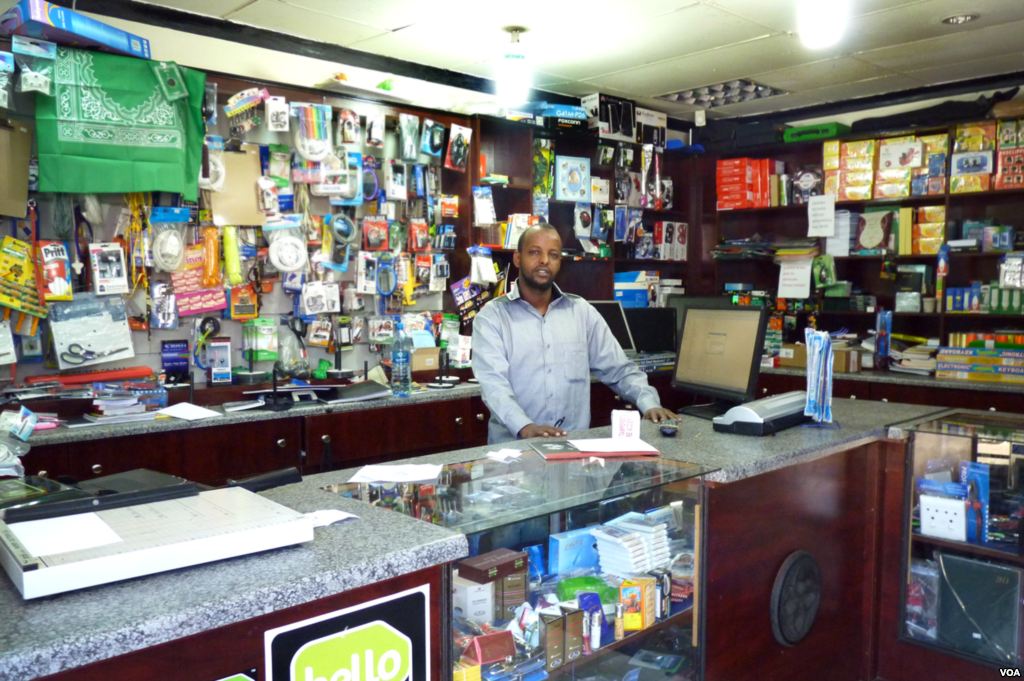
by: Solenn Honorine
Wednesday, November 28, 2012

Abdikadir Hassan Mohammed has been a victim of several robberies in his Mayfair shop in Johannesburg. (VOA/S. Honorine)
In the dry heat of the austral summer, 103th Street in Johannesburg recalls images from the other side of the continent. A veiled woman listens to Quran readings in her shop and Amin Salat, chairman of the Somali Association of South Africa, stops every two steps to shake hands with tall, lean men with the unmistakable bearing of people from the Horn of Africa.
“We are in... we call it here “Mogadishio”, the street of Mogadishio and the suburb of Mogadishio, but in fact it's Mayfair, in Johannesburg," said Salat.
Somalis form one of the most visible refugee minorities in South Africa. Because their country has not had a functioning government in two decades, they cannot be turned away by any country that has signed the U.N. Convention for Refugees.
Salat says that South Africa has a particular appeal for them. Its laws, described as “good” by the U.N. High Commissioner for Refugees, grant refugees the right to work, study and even a chance to become a full-fledged citizens, after a few years. And perhaps even more important, Salat says, South Africa has a no-camp policy, which allows refugees to settle wherever they want.
“The majority of them, they build a better life here in South Africa. When it come to education, business, what you're doing, you know, that kind of freedoms, you can do whatever you want and South Africa is better than any other country in Africa," he said.
But there is a very high price to pay to live in South Africa - security.
In 2008, xenophobic attacks flared throughout the country, displacing thousands of people. But even though this type of wide-scale violence has disappeared from the front pages, they have not stopped. Last year, the UNHCR recorded 100 violent deaths among refugees in South Africa.
“They hate us. They say to us “those East African people, they take all our business places," said a cafe owner.
“I was robbed once when I was in George. I was admitted to the hospital. I was in the hospital for seven days. I got 12 stitches on the left side of my face, as you can see. And... Yeah! It happens! That is common crime, that happens in the country," said a supplier.
Xenophobia plays a role in the violence against Somalis. But criminals also know that because of bureaucratic hurdles, it is difficult for refugees to open bank accounts. Robbers are so likely to find cash in Somali-owned stores that humanitarians say they have been nicknamed the community “ATMs” (automated bank-teller machines).
Abdikadir Hassan Mohammed, owner a small stationery store in Mayfair, agrees.
He says that every evening, he goes home with his pocket full of cash, and thieves know it. He has been robbed several times, and as long as he cannot use an ATM, he says he cannot have security and peace of mind.
Those problems are compounded by the fact that Somali traders work everywhere, in the poorest and most crime-ridden townships.
Mohammed Reys Osman, who supplies cellphones to local Somali shops around Johannesburg, says the risk of being robbed is ever present - so much so that he will stop working for the whole month leading up to Christmas, when violent crime in the area typically increases.
“These guys, their targets, it's that they want to find people that, even if they shoot them, nobody would follow. And, people who are easily targeted, that's mostly the Somalians. So, for me to lower my risk I'm working with South Africans," said Osman.
For the refugees, the biggest hope is to see an improvement in their own country's political situation. Signs are improving; the Somali Association of South Africa says a small group of refugees has chosen to go back this year. It is the first time in a decade it has happened.